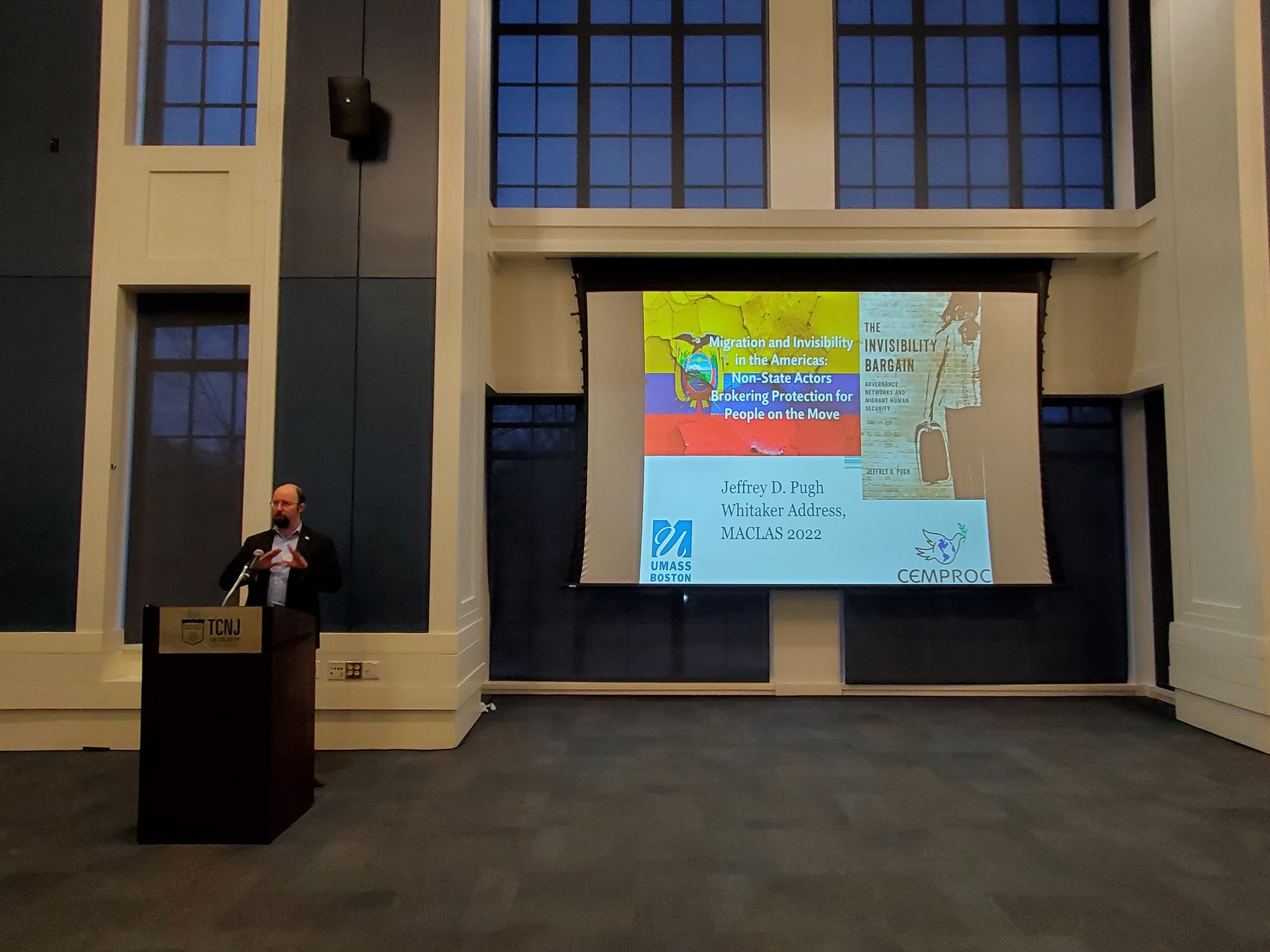The College of New Jersey
Hosts for MACLAS 2022
MACLAS CONFERENCE
March 18-19, 2022
Theme: Privilege, power, and pedagogy
We had a wonderful conference this past March 18-19, and thank all of our gracious hosts at the College of New Jersey for their kindness and hospitality before and during the event. Thanks also to everyone who participated both in person and in virtual sessions. Hope to see you next spring, 2023, at Salisbury University in Maryland!
Jeffrey Pugh gave the Whitaker Prize Address at the MACLAS 2022 Conference
The remainder of this page is archival information on the 2022 Conference.
Call for Papers 2022
For more than 500 years, waves of migration from Africa, Europe, and Asia combined with vibrant indigenous societies to make Latin America the most socially and culturally diverse region in the world. Yet the region is arguably the most socially unequal, as political-economic institutions and state violence have stratified societies along racial, ethnic, class, and gender lines. Intellectuals such as Gilberto Freyre, José Carlos Mariátegui, José Vasconcelos, and Paulo Freire, among many others, have sought to make sense of North-South, First-Third World conceptual chasms in order to explain the region’s structurally unequal diversity to an inquisitive audience. They inspired the formation of learning communities able to implement social practices aimed at effecting positive changes in the region.
This year’s MACLAS conference seeks to build on those inquiries to deepen and enrich our understanding of Latin American history and culture and the region’s manifold expressions and contradictions of power, privilege, and education. The conference theme supports the MACLAS statement on race/ethnicity and pedagogy. We strongly believe that studying and discussing these issues contributes to building a learning community engaged in critical as well as creative challenges to the ways in which an imperial/colonial framework has historically shaped relations in the Americas. As always, while MACLAS encourages papers that engage with the conference themes, other submissions are welcome. MACLAS seeks scholarship from a wide array of disciplines, perspectives, and topic areas in Latin American studies. Undergraduate and graduate students are warmly welcome to participate.
This is predominantly an in-person conference, but some hybrid sessions will be arranged to accommodate those who otherwise cannot attend. Only a limited number of virtual papers will be accepted due to technology and space limitations
** NEW: The final program is available for MACLAS 2022 (March 18-19) click here
To register for the conference go to: maclas2022.exordo.com Presenters from 2019 conference will be able to log on with the same credentials; new users will be asked to create a profile before reaching the submission page. You will need to supply:
Title of individual paper, panel, or workshop (specify which);
Your name (panel and workshop proposals must include the names, institutional affiliations, and paper titles of all presenters);
Your institution and position (faculty, graduate or undergraduate student, or other);
A 250-word abstract in English, Spanish, or Portuguese.
MACLAS offers prizes for the best book and best article or chapter published by a member in the last two years, as well as prizes for the best graduate and undergraduate papers presented at the conference. Graduate students are encouraged to apply for a Christina Turner Travel Award to help defray conference costs.
Fee Schedule:
Both Days: Membership (with annual income over $40K) + Registration Fee: $165 Early Bird (by Feb. 18) / $215 Regular (after Feb. 18)
One Day: Membership (annual income over $40K) + Registration Fee: $115 Early Bird (by Feb. 18) / $140 Regular (after Feb. 18)
Both Days for Students: Membership + Registration Fee: $140 Early Bird / $190 Regular
One Day for Students: Membership + Registration Fee: $90 Early Bird / $115 Regular
Please note that you must be a member of MACLAS to attend or present a paper at the conference. Questions? Contact MACLAS Treasurer Michael Schroeder: schroede@lvc.edu
Conference Lodging
MACLAS has arranged for a block of rooms at the SpringHill Suites, a four-minute drive and half-hour walk from The College of New Jersey. Use this link: Book Your Group Rate | Marriott International
For reservations over the phone, please call SpringHills Suites Marriot in Ewing’s Front Desk directly at 609-530-0999 and mention your Phone Code: LASS. Please reserve by February 24, 2022 for the group rate of $119 per night
Other places
Downtown Trenton, NJ
Princeton, NJ, roughly 15 minutes away by car Route 1 in Princeton has many hotels, accessible by car.
Local tourism
Old Barracks Museum, Trenton: https://www.barracks.org/
Grounds for Sculpture: https://www.groundsforsculpture.org/
Downtown Philadelphia and Princeton
Travel Information
Parking and transportation
For a parking permit on campus Click here
Address: 2000 Pennington Rd, Ewing Township, NJ 08618
Parking is free but cars must display a permit that we can email to attendees. Campus map: https://tcnj.edu/about/campus-info/campus-map/
Airports:
Trenton-Mercer, Philadelphia, Newark NJ and NYC airports
Rail: Trenton Station
Amtrak: (800) 872-7245
NJ Transit: (800) 772-2222
Directions to TCNJ from Trenton Train Station: From Trenton Train Station a taxi is ~$20.00 to the TCNJ
Campus, and will take~10 minutes, or take NJ Transit Bus #601 to TCNJ which costs $1.50 and will take approximately 20 minutes.
Directions to TCNJ from Newark: You can catch the NE Corridor train right from the Newark airport. There's a short Air Train ride from the airport terminal to the train station. Buy your train ticket in the airport before you get on the AirTrain. Then catch the NE Corridor Train towards Trenton. For a map, see: https://d2g63oyneaimm8.cloudfront.net/sites/default/files/NJ%20TRANSIT%20Rail%20System%20Map%20%E2%80%93%20October%202021.pdf
TCNJ COVID-19 Protocol
The best protection against the virus remains the basics: physical distancing, face coverings and regular hand washing and sanitizing. We will continue to require face coverings in all indoor public spaces—the only exceptions are when alone in private space or while actively eating or drinking—and outdoors when physical distancing is not possible. We strongly encourage the use of N95 or KN95 masks, which offer more protection than do cloth masks. For more information check:Spring Semester Protocol Update | Covid-19 (tcnj.edu)


